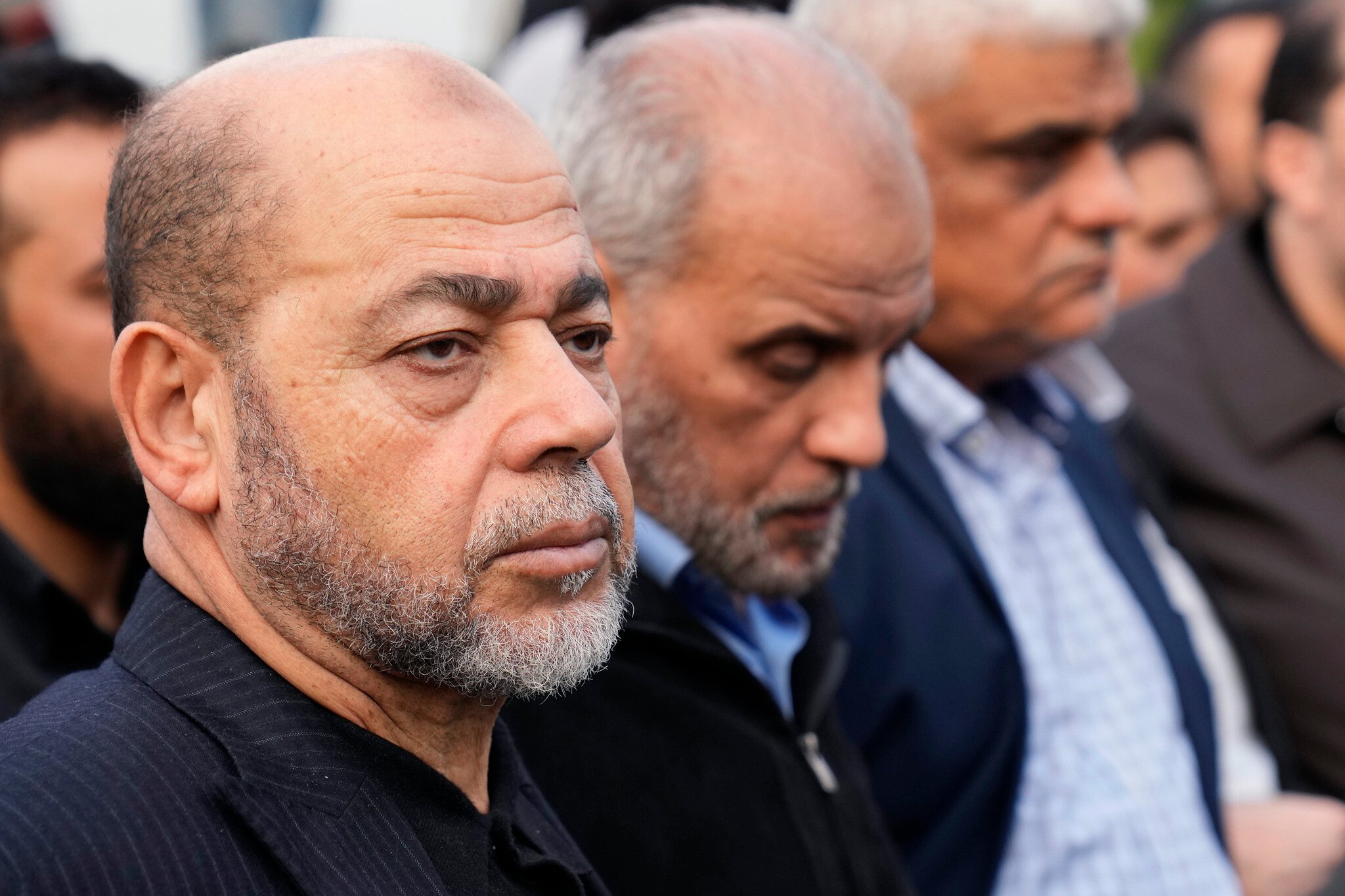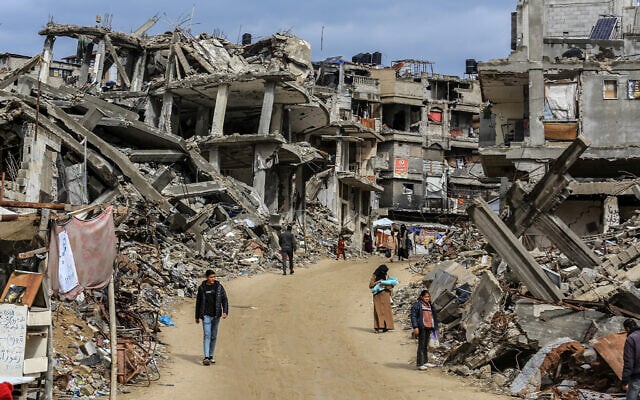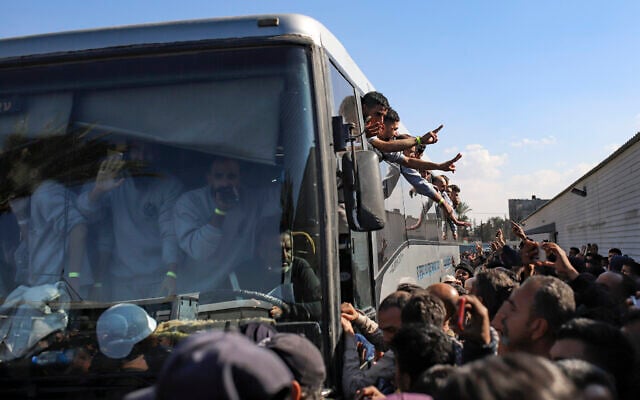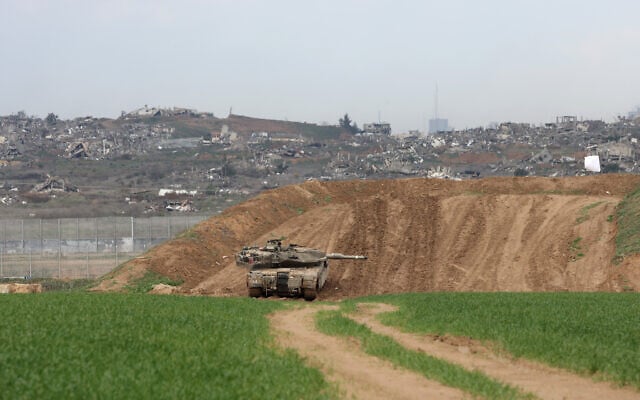



Senior Hamas politburo member Moussa Abu Marzouk said he would not have backed the October 7, 2023, invasion and onslaught in southern Israel if he had known what the consequences would be for the Gaza Strip, in an interview with The New York Times that was conducted on Friday and published on Monday.
The October 7 attack — in which thousands of Hamas-led terrorists burst across the Gaza-Israel border, killing some 1,200 people, mostly civilians, and taking 251 hostages, amid rampant acts of brutality and sexual assault — sparked the subsequent war in Gaza, which has devastated the enclave, seen tens of thousands killed, and prompted the US president to call for the forced relocation of the more than 2 million residents of the Strip.
The war has also, through fighting on other fronts, significantly weakened Iran’s so-called “Axis of Resistance,” devastating the Hezbollah terror group in Lebanon, and indirectly contributing to the collapse of the Iran-backed Bashar al-Assad regime in Syria.
“If it was expected that what happened would happen, there wouldn’t have been October 7,” Abu Marzouk said, asserting that — though he claimed to not have been privy to the exact details of the planned assault — he could not have brought himself to approve it, knowing what he knows now.
The statement of regret marked a departure from previous statements by Hamas officials. A few weeks after the invasion, for example, politburo member Ghazi Hamad publicly declared that October 7 was “just the first time, and there will be a second, a third, a fourth,” saying, “we are ready to pay” the price, and vowing to continue until Israel was totally annihilated.
And in the weeks since a hostage release-ceasefire deal was reached last month, Hamas and its allies have also repeatedly called the war a “victory” for their cause.
Indeed, Abu Marzouk’s remarks were quickly countered by Hamas spokesman Hazem Qassem, who said: “The occupation’s aggressive and destructive behavior is the cause of the destruction in Gaza. The October 7 epic marks a strategic turning point in the Palestinian national struggle.”
In a statement issued a short while later by the group itself, Hamas claimed Abu Marzouk’s comments were “incorrect and taken out of context.”
“The interview was conducted a few days ago and the published statements did not reflect the full content of the answers,” the terror group contended.
In the interview, Abu Marzouk said Hamas’s survival, despite Israel’s campaign in Gaza, constituted a “kind of victory,” comparing the group, which has been the de facto government of Gaza since taking over from the Palestinian Authority in a 2007 coup, to a regular person who has survived a boxing match with heavyweight champion Mike Tyson — but he said that in absolute terms, it would be “unacceptable” to call the war a win for the terror group.
“We’re talking about a party [Israel] that lost control of itself and took revenge against everything,” Abu Marzouk claimed. “That is not a victory under any circumstances.”
In the interview, Abu Marzouk also said he was open to discussing the potential disarmament of the terror group in Gaza, saying that, “We are ready to speak about every issue,” and, “Any issue that is put on the table, we need to speak about it.” He declined, however, to answer specific questions about what a compromise on disarmament might look like.
The comments seemed to contradict more hardline statements from other public leaders of late, such as politburo member Osama Hamdan, who said this month that “the weapons of the resistance” were non-negotiable.
Asked about Hamdan’s remarks, Abu Marzouk told The New York Times that no one leader could set the organization’s agenda.
Qassem, the Hamas spokesman, also rejected this suggestion, saying: “We hold onto our resistance weapon as a legitimate right, and what was attributed to Moussa Abu Marzouk does not represent the movement’s stance. Resistance in all its forms is a legitimate right for our people until liberation and return.”
Asked about the ongoing, fragile hostage release-ceasefire deal, which has paused fighting in the Strip as Hamas has freed captives who were mostly abducted on October 7 and Israel has set free over a thousand Palestinian security prisoners, including many terror convicts, Abu Marzouk said he was open to extending the three-part deal’s first phase, which is currently slated to end on Saturday.
He said, however, that the group would demand far more security prisoners released in exchange for each of the remaining hostages than it had for those released in the past, noting that Hamas considers all the remaining living captives — including those who are in fact civilians — to be soldiers.
Abu Marzouk suggested 500-to-1 and 1,000-to-1 as possible prisoner-to-hostage ratios for the remaining captives, which are likely to be rejected out of hand by Israel.
The interview was conducted before Israel’s decision on Saturday to freeze the release of 602 security inmates in exchange for six living hostages, after those hostages were released in propaganda ceremonies that the state called “humiliations.”
Abu Marzouk added that Hamas is also open to releasing all the hostages at once, in exchange for an end to the war and the release of all Palestinian prisoners — which Israel has rejected.
The deal requires Hamas to gradually release all its hostages, Israel to release thousands of Palestinian security prisoners in return, and both sides to halt fighting in the Strip, as the sides negotiate for a “sustainable calm” and the IDF withdraws gradually from the enclave.
With the first phase of the deal set to end this coming Saturday, negotiations are ongoing for the second phase, which envisions Hamas releasing all remaining living hostages — at most 27 of the 63 captives — in exchange for several thousand Palestinian security prisoners, a full Israeli withdrawal from Gaza, and a permanent end to the war.
US President Donald Trump’s Mideast envoy Steve Witkoff said Sunday that, “We will get to phase two… I think it’s going to happen,” but called any Hamas role in the postwar government of the Strip a “red line.”
Meanwhile, Israeli leaders have repeatedly stressed in recent days that there are battle plans ready, in the event that the deal should collapse and fighting resume.
On Monday, the Israel Defense Forces struck a rocket launching site in Gaza, from which a rocket had been fired at Israel but fell short in the Strip, the military said. It added that a second rocket launch site in the area was also targeted.
Emanuel Fabian contributed to this report.




